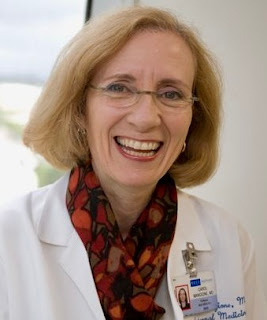Many doctors are questioning Katie Couric's new call for ultrasound screenings beyond annual mammograms to detect breast cancer.
A recent online Kaiser Health News story by Michelle Andrews notes that the 65-year-old former co-host of NBC's "Today" show is now pushing those sonograms because they "can sometimes identify malignancies that are hard to spot on a mammogram in women whose breasts are dense — that is, having a high proportion of fibrous tissue and glands vs. fatty tissue."
 |
| Dr. Carol Mangione |
Dr. Sharon Mass, an OB-GYN in Morristown, New Jersey, and the former chair of the American College of Obstetricians and Gynecologists' New Jersey section, echoes that sentiment. "On the one hand," Andrews' piece quotes her as saying, "we want to do everything we can to improve detection. But on the other hand, there are lots of costs and emotional distress" associated with false-positive results.
Couric first shared the news of her own breast cancer diagnosis in September.
In addition to regular mammograms, many women are getting 3D mammograms, sonograms or MRIs as supplemental testings. That imaging in those who aren't at high risk for breast cancer, the KHN story says, "may identify potential trouble spots, which can lead to follow-up testing such as breast biopsies that are invasive and raise cancer fears for many patients. But research has found that very often these results turn out to be false alarms."
And that doesn't count the possible extra cost. "An ultrasound screening might cost $250 out-of-pocket while a breast MRI could run $1,084," according to the Brem Foundation to Defeat Breast Cancer," Andrews' story says.
Meanwhile, Rep. Rosa DeLauro (D-Conn.) recently tweeted that she's working in conjunction with Couric on a bill to cover MRIs and ultrasounds for women with dense breasts "without any out-of-pocet costs," the article reports.
What are the real results of added screenings? Studies show, the KHN piece notes, that "if 1,000 women with dense breasts get an ultrasound after a negative mammogram, the ultrasound will identify two to three cancers. But the extra imaging will also identify up to 117 potential problems that lead to recall visits and test but are ultimately determined to be false positives."
Mass' group doesn't recommend supplemental screening for women with dense breasts who don't have any additional risk factors for cancer, the article reports. "Many other professional groups take a similar position."
Dense breasts, the story says, "are relatively common. In the United States, an estimated 43% of women 40 and older have breasts that are considered dense or extremely dense…Women with dense breasts are up to twice as likely to develop breast cancer as women with average-density breasts, research shows."
Other steps instead of extra screening could be helpful, according to Dr. Karla Kerlikowske, a professor of medicine and epidemiology/biostatistics at the University of California, San Francisco. "If you really want to help yourself, lose weight," she's quoted as saying. "Moderate your alcohol intake and avoid long-term hormone replacement. Those are things you can control."
Additional information on mammograms, sonograms and other screenings can be found in Rollercoaster: How a man can survive his partner's breast cancer, a VitalityPress book that I, Woody Weingarten, aimed at male caregivers.
No comments:
Post a Comment